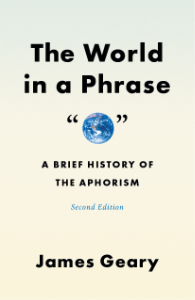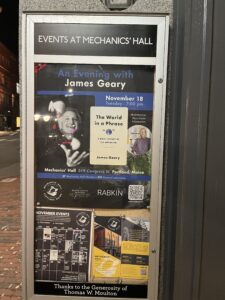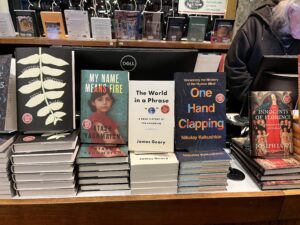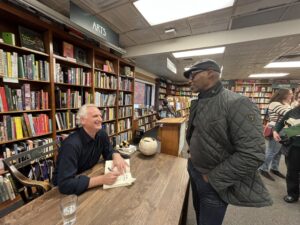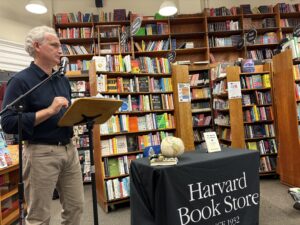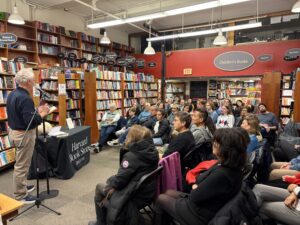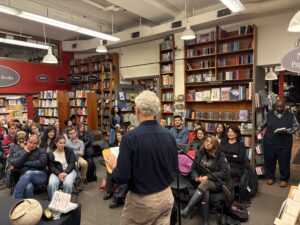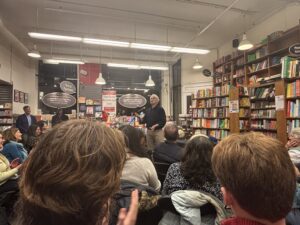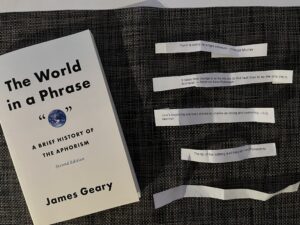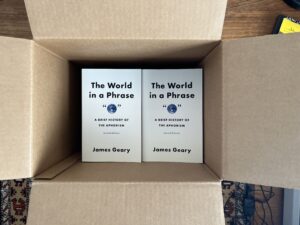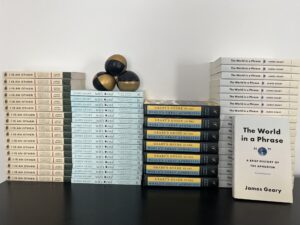… is a question often heard when talking about how to define an aphorism and distinguish it from all the other kinds of short sayings out there. So, if my 5 Laws of the Aphorism do not suffice, here’s a handy field guide to spotting the difference between an aphorism and a …
What is the difference between an aphorism and an adage?
An adage is a variation on a proverb and feels slightly hackneyed. An aphorism is always fresh.
What is the difference between an aphorism and an apothegm?
An apothegm is an anecdote, usually concerning historical persons and often set in antiquity, which may or may not have an aphorism as its punchline.
What is the difference between an aphorism and an axiom?
An axiom is a self-evident proposition, usually on which an argument or theory is based. An axiom must be true, or at least believed to be true. Aphorisms can contradict each other.
What is the difference between an aphorism and a bromide?
Potassium bromide is used in medicine as a sedative. Literary bromides have the same effect.
What is the difference between an aphorism and a dictum?
A dictum is meant to settle an issue or pronounce a verdict. An aphorism incites debate.
What is the difference between an aphorism and an epigram?
Epigrams usually rhyme, are often funny and cynical, and are always intended to castigate or criticize a rival. When they are also philosophical, they are aphorisms.
What is the difference between an aphorism and an epithet?
An epithet is a nickname, or a descriptive phrase characteristic of a particular individual. While an aphorism is also specific, its application can be extended to encompass groups — of people, things, or situations.
What is the difference between an aphorism and an euphemism?
A euphemism is a clever, delicate phrase that expresses what you mean without actually saying it; an aphorism says exactly what you mean in precisely those words that best express it.
What is the difference between an aphorism and an euphuism?
Euphuism is a term used to describe the ornate, embellished, verbose style of Elizabethan writers like John Lyly. A euphuism is typically overly-long but also strangely beautiful. If you took a page of euphuistic prose, brought it to a low boil, and let it simmer overnight, you would wake up with an aphorism.
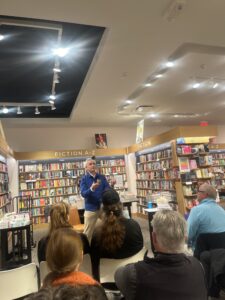
What is the difference between an aphorism and a fragment?
A fragment is a piece of writing that is, deliberately or involuntarily, left unfinished. An aphorism is complete in itself, the first (or last, per Marie von Ebner-Eschenbach) link in a long chain of thought.
What is the difference between an aphorism and a haiku?
A haiku is impressionistic, imagistic, usually leaving an emotion or feeling rather than a thought in its wake. An aphorism, while often deploying startling imagery, always provokes thought in addition to emotion and feeling.
What is the difference between an aphorism and an idiom?
An idiom is a short metaphorical expression that cannot be understood through a literal interpretation of its constituent words; e.g. He “kicked the bucket.” An aphorism is also short and often metaphorical, but it is almost always a full sentence (rather than just an expression) whose meaning is usually not literal but can be discovered through analogy; e.g. “It is hard to dismount from a tiger.”
What is the difference between an aphorism and a joke?
An aphorism is a joke shorn of everything but the punch line.
What is the difference between an aphorism and a maxim?
A great maxim is also an aphorism. An inferior maxim is merely a rule of conduct.
What is the difference between an aphorism and a motto?
Aphorisms can — and should! — be used as mottoes, but not all mottoes are aphorisms. Run-of-the-mill mottoes are simply statements of belief or principles of conduct.
What is the difference between an aphorism and a nostrum?
Originally, a nostrum was defined as a medicine prescribed by a quack. Literary nostrums are psychic snake oil.
What is the difference between an aphorism and an old saw?
An aphorism gleams with the sharpest of wit; an old saw is rusty and no longer cuts it.
What is the difference between an aphorism and a parable?
A parable is an anecdote, usually fictitious and mostly of a spiritual or moral nature, that may or may not have an aphorism within it that sums up its lesson.
What is the difference between an aphorism and a platitude?
An aphorism shakes you up, unnerves you; a platitude is trite and induces complacency. A platitude is a placebo for the mind; an aphorism is an electric shock.
What is the difference between an aphorism and a precept?
A precept is a motto intended for personal use.
What is the difference between an aphorism and a proverb?
The author of an aphorism is known; the author of a proverb is long forgotten. Proverbs are aphorisms that have had the identity of the author worn away from frequent use.
What is the difference between an aphorism and a quip?
A quip has a shelf life of about 15 minutes. An aphorism is immortal.
What is the difference between an aphorism and a quotation?
A quotation is just something somebody said.
What is the difference between an aphorism and a saying?
“Saying” is a generic term for all these types of expressions, including aphorisms.
What is the difference between an aphorism and a soundbite?
A soundbite is just something some politician said.
What is the difference between an aphorism and a slogan?
A slogan is a motto intended for corporate use.
What is the difference between an aphorism and a truism?
A truism is a platitude presented as if it was a brilliant new discovery.
What is the difference between an aphorism and a witticism?
A witticism, like an aphorism, can achieve immortality, but it is just funny rather than philosophical.
